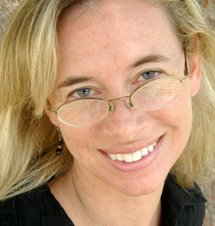U.S. customs agents must have the dreariest job of all Federal employees. I imagine that a lottery is cast among applicants for government posts and the losers are remanded to cubicles in airports. They stand at their stations in a windowless expanse of room where they process endless queues of people.
For eight hours, they are completely cut off from the outside world in this no-man's territory located on an imaginary demarcation between outside-the-country and inside-the-country. It's lonely in a place that so many people pass through, but none stays.
All through their shifts, pale, emotionless customs officers greet tan, exuberant souvenir-toting arrivals returning home from abroad. It's thankless work interrogating people who have been places, seen sites, done things. Thinking up new questions to stump homecomers and create a bug in the routine, a blip on the radar, carving out craved excitement from the monotonous toil becomes tantamount to other responsibilities.
On my recent return to the U.S. from my trip to Scotland, I went through customs in the Atlanta Hartsfield Airport. I waited patiently in line, making sure not to do anything suspicious. I learned my lesson about looking suspicious on a previous re-entry to the country. Federal folks working in that tomb of a room are always looking for distractions from their aching feet and under-stimulated brains. They made me their distraction that evening, initiating me into the club of detainees sequestered behind locked doors in small rooms where multiple officers enter and exit all asking the same five questions. It's a stand off to see who can hold out longer.
I won that round, but I didn't desire to go another. So, on my return from Europe I made a special effort to blend in with the carpet and take on the countenance of a stock character. I stood in line but I did not stand out.
When I finally reached my turn with a customs officer, I extended my passport and looked plain. Without inflection, he asked me where I had been, why I had gone there, how long I had stayed, who went with me, my maiden name, my shoe size, and what purchases I had made. At last satisfied with his efforts to discomfort me, he closed my passport and slid it toward me. "What do you do for a living," he tacked on, one last try at tripping me up.
"I'm a freelance writer," I replied.
"You write books," he snorted, his fingertips still pressing my passport to the surface of the desk.
"Yes, and magazine articles and newspaper pieces," I added, placing my hand on the desk but not touching my passport.
"Are you wealthy," he uttered more as a challenge than a question.
I saw his knuckles relax. It was my chance to retrieve my passport and step across the imaginary line into my homeland. I picked it up, began striding away and responded to his final question, "No. I'm happy."
In retribution, he summoned the agriculture inspector to detain my parents.
For eight hours, they are completely cut off from the outside world in this no-man's territory located on an imaginary demarcation between outside-the-country and inside-the-country. It's lonely in a place that so many people pass through, but none stays.
All through their shifts, pale, emotionless customs officers greet tan, exuberant souvenir-toting arrivals returning home from abroad. It's thankless work interrogating people who have been places, seen sites, done things. Thinking up new questions to stump homecomers and create a bug in the routine, a blip on the radar, carving out craved excitement from the monotonous toil becomes tantamount to other responsibilities.
On my recent return to the U.S. from my trip to Scotland, I went through customs in the Atlanta Hartsfield Airport. I waited patiently in line, making sure not to do anything suspicious. I learned my lesson about looking suspicious on a previous re-entry to the country. Federal folks working in that tomb of a room are always looking for distractions from their aching feet and under-stimulated brains. They made me their distraction that evening, initiating me into the club of detainees sequestered behind locked doors in small rooms where multiple officers enter and exit all asking the same five questions. It's a stand off to see who can hold out longer.
I won that round, but I didn't desire to go another. So, on my return from Europe I made a special effort to blend in with the carpet and take on the countenance of a stock character. I stood in line but I did not stand out.
When I finally reached my turn with a customs officer, I extended my passport and looked plain. Without inflection, he asked me where I had been, why I had gone there, how long I had stayed, who went with me, my maiden name, my shoe size, and what purchases I had made. At last satisfied with his efforts to discomfort me, he closed my passport and slid it toward me. "What do you do for a living," he tacked on, one last try at tripping me up.
"I'm a freelance writer," I replied.
"You write books," he snorted, his fingertips still pressing my passport to the surface of the desk.
"Yes, and magazine articles and newspaper pieces," I added, placing my hand on the desk but not touching my passport.
"Are you wealthy," he uttered more as a challenge than a question.
I saw his knuckles relax. It was my chance to retrieve my passport and step across the imaginary line into my homeland. I picked it up, began striding away and responded to his final question, "No. I'm happy."
In retribution, he summoned the agriculture inspector to detain my parents.







 Like this? Please
Like this? Please 
1 comment:
There's my idea of a job from hell!
Post a Comment